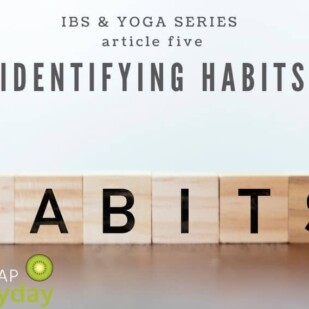If you have Irritable Bowel Syndrome (IBS), it’s critical to keep an eye on your stress. That’s because stress makes IBS, an already difficult disorder, even more challenging.
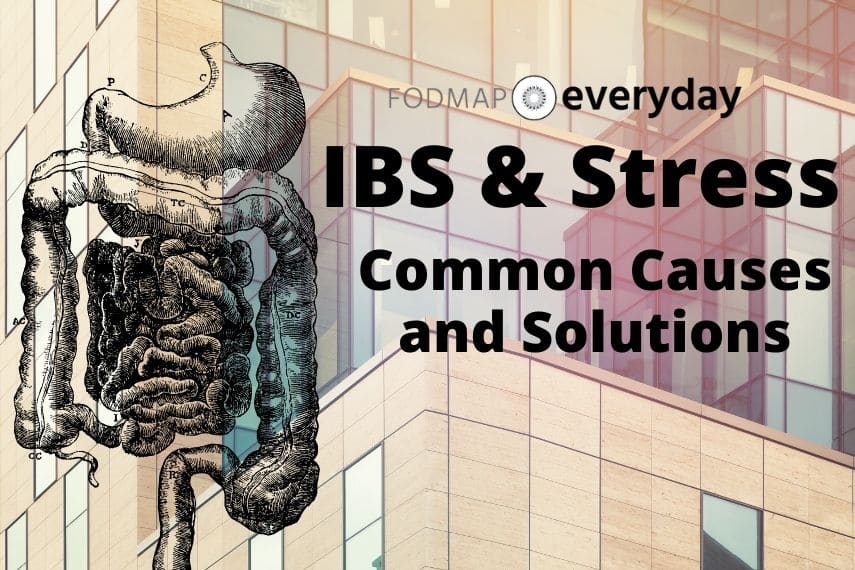
IBS & Stress: An Unhappy Alliance
If you are someone who suffers from IBS, there’s a good chance you can recall a time when stress made your symptoms more difficult. Perhaps, you were working under a deadline or arguing with your partner and you experienced pain and urgency in your digestive system.
Stress can have a harmful effect on the gut. It can trigger a host of unpleasant symptoms, including cramping, bloating, constipation, diarrhea, overeating, and weight gain.
If you have IBS, learning to manage your stress can make a world of a difference. When you’re less stressed, symptoms can be minimized and you can participate in a greater range of experiences that constitute a rich and rewarding life.
What Is Causing Your Stress?
If you are seeking to manage your stress, one of the first things you need to do is understand what’s causing your stress. Once you know what’s causing your stress, you can do something productive about it.
We asked you to tell us about your top stressors, and we got answers! Below are some of the most common causes of stress for IBS sufferers as shared by our community members.
Following this are our tips and guidance for alleviating stress. Make sure to read to the end to discover proven solutions for your stress and related symptoms.
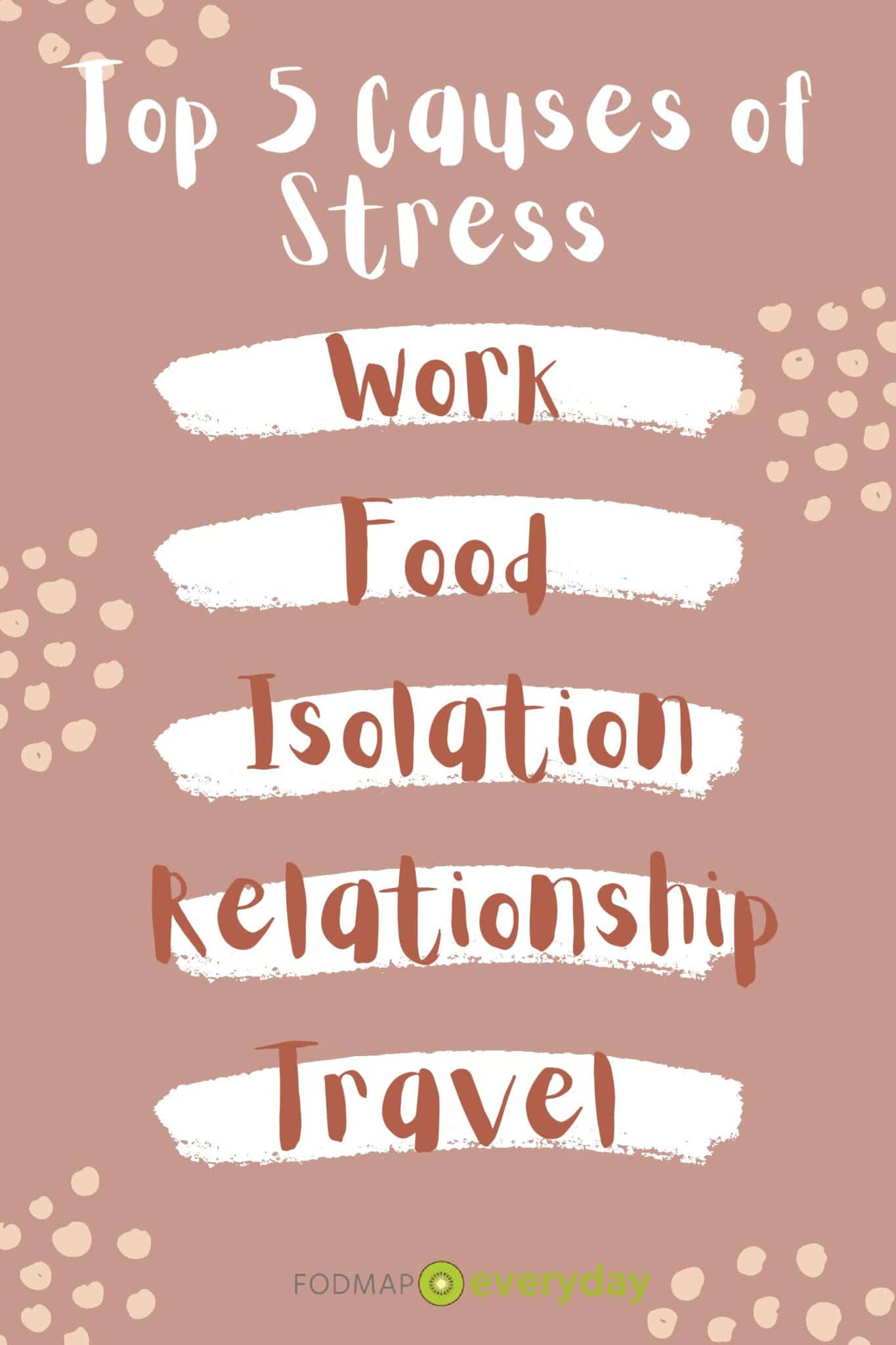
Top 5 Common Causes of Stress For People With IBS
Work
The number one cause of stress according to our readers is related to work.
Many of us devote the majority of our time during the week to our jobs and even if we love what we do for a living, there is still stress that arises in the day-to-day goings-on at the workplace. If we actively dislike our work, our stress is likely to be higher.
Difficult coworkers, demanding management styles, long commute times, and unreasonably high expectations can all contribute to a more stressful workplace.
Food
For those who have IBS, food can be a constant source of stress. That’s because so many foods can exacerbate IBS symptoms. One minute, you’re enjoying a meal, and the next, you’re worrying about rushing to the nearest restroom.
With food being so central to our culture, it’s easy to feel like an outsider when you have IBS. What can be a source of joy for so many people may understandably be a big source of stress for you.
Social Isolation
Living with IBS can feel isolating. According to statistics, approximately 8 out of 10 people don’t have IBS. That means that most people don’t understand what it’s like to cancel a date last-minute because you’re worried you’ll have to get up from the table every 30 minutes, or to panic whenever you get invited to a pool party.
As human beings, one of our core evolutionary needs is to be a part of a tribe. For thousands of years, this ensured our survival. When we feel that we don’t belong, our bodies respond by producing cortisol and adrenaline, which take a toll on our health and happiness.
With IBS, you’re struggling not only with symptomatic stress related to digestive upsets, but with emotional stress related to feelings of isolation. That’s a lot to carry.
Intimate Relationships & Dating
Many people with IBS report that dating is a big stressor. Some report that they’ve given up dating altogether.
In romantic contexts, it’s natural to feel worried about your IBS. You may have thought to yourself, What if I can’t make it to the restroom in time? or What will he or she think when I tell them about my symptoms? Bloating and gassiness are not your friends when you’re seeking to be intimate with another person.
When you do enter into an intimate relationship, the restrictions you live with can make life more challenging for your partner and cause tensions and conflicts.
You May Want To Read: Dating Tips for Teens and Young Adults with IBS and How To Help Friends & Family Understand Your Low FODMAP Diet
Traveling
Traveling is a major source of stress for those with IBS. Whether you’re traveling by car, subway, plane, or something else, the unpredictable nature of your IBS symptoms can make traveling an unpleasant experience, especially when you’re traveling in public.
One community member shared that her husband loves to travel and she is now terrified to get on a plane because she can’t be sure she can wait for access to the bathroom—and that this is creating problems in their marriage.
You May Want To Read: Traveling With IBS Series
Alleviating Stress: Tips and Guidance for IBS Sufferers
Your Stress Relief Guidance
Fortunately, there are many things you can do to alleviate your stress and your accompanying IBS symptoms. The following guidance comes from The Feel Good Life Methodology, a proven process based in science and psychology that relieves stress and restores well-being.
You May Want To Read: IBS and Stress Series: The Feel Good Life – A Methodology To Reduce Stress
Unhealthy Strategies: False Good Habits
Have you ever, in a moment of stress, indulged in a pint of ice cream, poured yourself one too many glasses of wine, said something hurtful you didn’t actually mean, or tried to soothe yourself with some “retail therapy?”
In the language of The Feel Good Methodology, these behaviors are called “False Good Habits,” and they’re the unhealthy coping tools we tend to reach for when we’re feeling stressed.
As their name suggests, False Good Habits aren’t actually good for us. They appear good, superficially by promising us a few moments of pleasure, but always with the “catch” that we’ll have to pay for it later.
When we eat too much of the wrong kinds of food, we enjoy the tastes, but then upset our digestive system. When we smoke a cigarette, we get a “rush,” but then harm our lungs. When we are careless with our words, we blow off steam, but then damage trust.
The things we hoped would bring us relief end up making us feel worse than we did before.
You May Want To Read: 5 Easy Steps To Change Any Habit
Why We Use False Good Habits
False Good Habits are never worth it. Yet, many of us know this and have tried to stop ourselves from doing them, with little or no success. What gives?
There’s a perfectly good reason for everything we do.” You see, we reach for False Good Habits when we’re stressed because we’re not able to make high-quality decisions in that state. We just want to feel better—fast—and False Good Habits help us accomplish that, at least initially.
Research shows that when the body is in a state of stress, neurons in the brain’s prefrontal cortex, or higher-order thinking center, stop firing. In other words, rational thinking is significantly less accessible when you’re stressed.
In our evolutionary past, this was life-saving; by acting first and thinking later in life-or-death situations, we gained precious seconds that tipped the odds of living in our favor. We couldn’t afford to “overthink it,” because by the time our brains finished processing whether or not that approaching animal was a predator or prey, we’d be lunch.
In today’s world, the inability to think at full capacity in states of stress is no longer an asset. Instead, it’s the reason why we overeat, over-drink, overspend, and overreact, even when we know we shouldn’t.
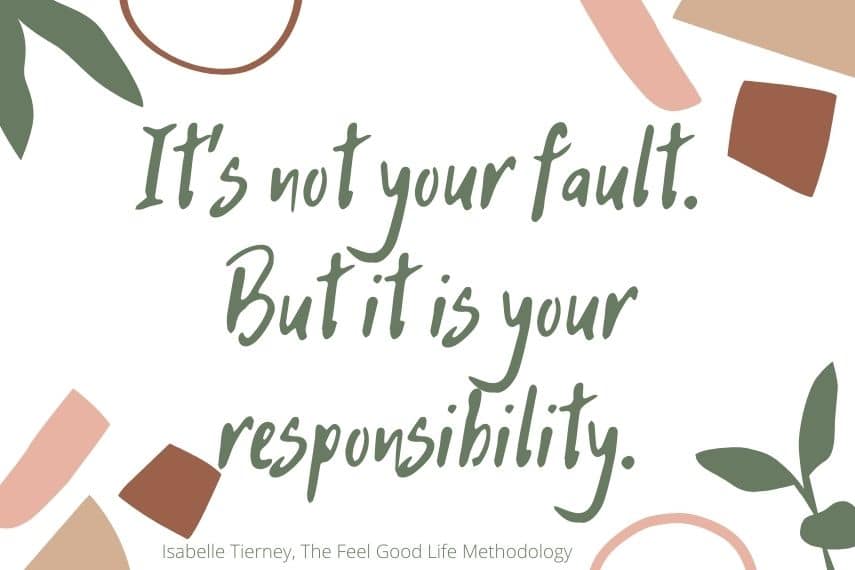
It’s Not Your Fault, But It Is Your Responsibility
Take a moment and notice how it feels to learn this information.
Behaviors like overeating and over-drinking tend to carry a lot of shame. When you understand that they’re not your fault, but rather, are just your best attempts to feel better when you’re stressed because your brain isn’t working properly, you free yourself from that shame.
And yet, this doesn’t mean that you can’t do anything about them. As we like to say in the Feel Good Methodology: “It’s not your fault, but it is your responsibility.”
It’s not your fault that you want to act out False Good Habits. But it is your responsibility—to your body, your mind, your loved ones—to choose something different, that’s constructive rather than destructive.
So what is the solution?
First, understand that there are specific, scientifically-based strategies that not only soothe stress, but support well-being. Second, choose to use these strategies as often as possible.
Healthy Strategies: Feel Good Habits
According to the Feel Good Life Methodology, these stress-reducing strategies are called “Feel Good Habits,” and they’re the behaviors that allow you to feel good sustainably.
Feel Good Habits provide immediate stress relief, but unlike False Good Habits, don’t have destructive consequences. Instead, they steadily uplift your state and your quality of life.
Take, for instance, the act of going for a walk in nature. This Feel Good Habit relieves stress anxiety, and inflammation, and boosts your mood and energy.
Or, consider the Feel Good Habit of calling a friend. This activity alleviates stress, loneliness, and isolation and nourishes you with social support. When you’re feeling stressed, having a friend offer a listening ear and words of encouragement can significantly shift the way you feel.
Feel Good Habits are the cornerstones of sustainable well-being. When you consistently choose them instead of False Good Habits, you gain relief from stress that lasts.
The Methodology contains a wellspring of Feel Good Habits that are each supported by research.
Slow, Sustainable Steps
As you “try on” these Feel Good Habits, be kind to yourself.
Making the change from False to Feel Good Habits isn’t always easy. If you’ve been relying on False Good Habits to cope with stress for a while, it’s important to understand that there are strong neural connections in your brain that make those behaviors automatic and accessible.
In the beginning, you may feel strong urges to do the False Good Habits you’re used to doing, and resistance to the Feel Good Habits you actually want to be doing.
This is normal. takes time to change your habits. But each time you choose a Feel Good Habit, you’re strengthening the neural connections underlying it, and weakening the connections underlying the habit you used to do. So celebrate yourself each time you make a behavioral change, no matter how small.
The Feel Good Life Methodology offers a free Facebook Community dedicated to supporting you in making slow, sustainable behavioral changes. Click here to meet others like you who are learning to use this Methodology to relieve stress and improve the quality of their lives.
Below, are five Feel Good Habits that you can turn to in a moment of stress for immediate, lasting relief.
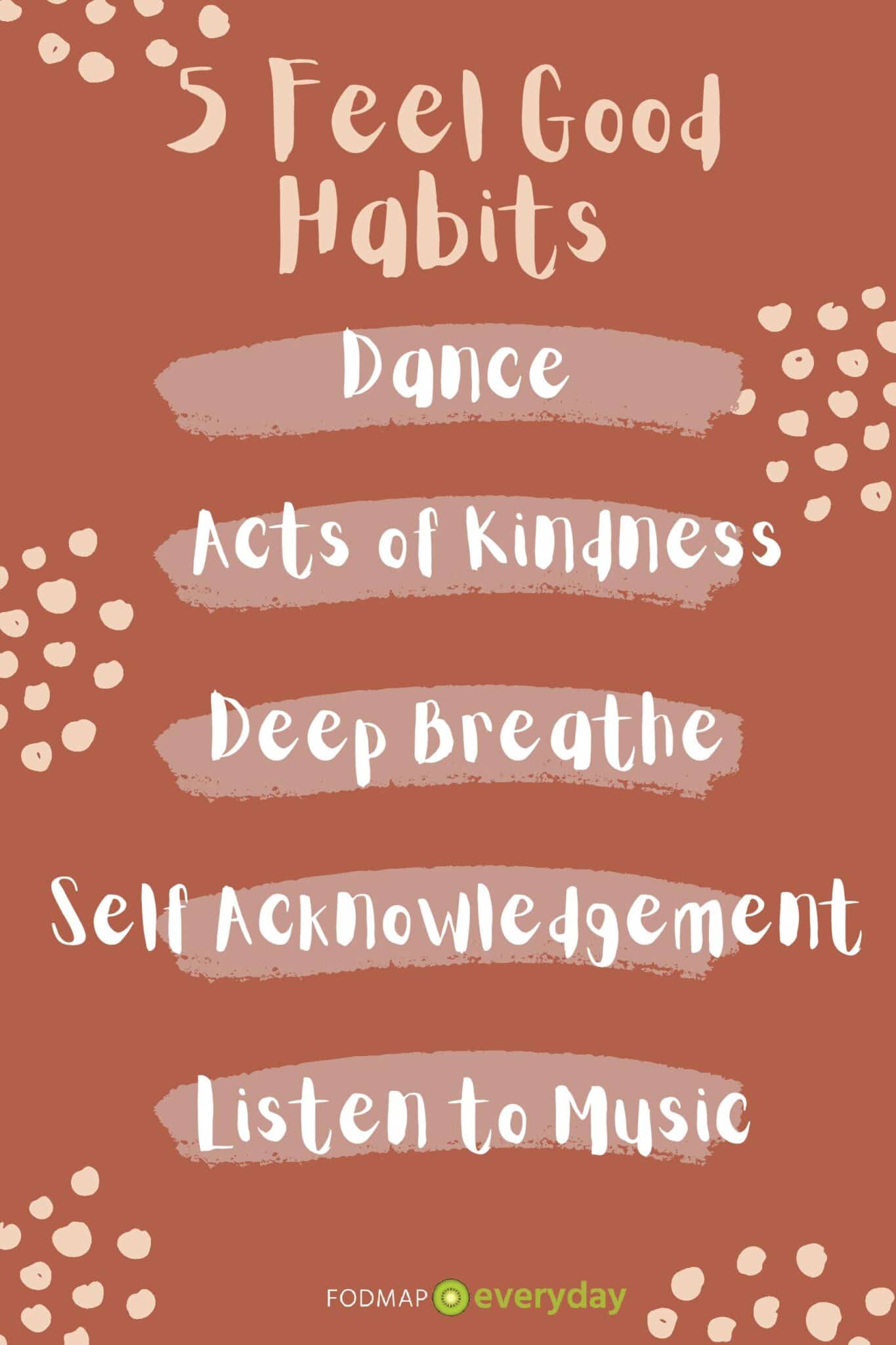
5 Research-Based Feel Good Habits
Dance
Dancing is a fabulous way to let loose and have fun. It’s hard to take yourself too seriously while you’re dancing to a silly song. In addition to lowering stress, dancing has many other health benefits, including protecting against depression, uplifting mood, enhancing flexibility, and accelerating weight loss.
Do an Act of Kindness
Researchers from Yale found that helping others is an antidote for stress. Participants in their study who performed acts of kindness—such as paying a stranger’s bus fare, lending a friend a book, or bringing cookies to a neighbor—reported feeling less stressed than those who didn’t. “Prosocial behavior may be an important component in coping with stress,” the researchers concluded.
When you’re feeling stressed, it may seem counterintuitive to help others, but the fact is, when we give, we gain.
Breathe Deeply
Taking deep, belly breaths can induce the relaxation response, an altered physiological state where the mind and body feel relaxed and at ease. According to Herbert Benson, MD, a researcher at Harvard, accessing this state often can counteract the harmful effects of stress. Benson recommends dedicating 10-20 minutes a day to deep breathing for the best results.
You May Want To Read: Yoga and IBS Series: It’s Your Body!
Acknowledge Yourself
Psychologists say that when it comes to stress, our “inner dialogue” matters. It should come as no surprise that self-criticism can amplify stress, anxiety, and other negative emotions. After all, when someone else says something mean to us, it can hurt us. When we’re mean to ourselves, the same is true.
Changing the way you speak to yourself can work wonders for your stress. If you’ve got a nasty “inner critic,” don’t allow it to have the last word. Instead, reaffirm yourself. If your inner critic says you failed, remind yourself that you had the courage to try. If it says you’re no good, remind yourself of your positive qualities. Seeking to build yourself up rather than tear yourself down is a recipe for successful stress management.
Listen to Music
In a meta-analysis of 400 studies, music was shown to significantly relieve stress. Apparently, listening to music lowers levels of cortisol in the body.
Researchers at Stanford University claim that “listening to music seems to be able to change brain functioning to the same extent as meditation.” Like meditation, music can alter brain waves. Listening to a song at 60 beats per minute induces alpha brainwaves, which are associated with feeling relaxed. Speeding up the beat encourages beta brainwaves (alertness), while slowing down the beat encourages delta brainwaves (sleep).
For stress relief, listen to slow, soothing music you enjoy. Consider songs that incorporate string or wind instruments and sounds of nature, such as thunder, birds, and rain.
Are you ready to seize a momentous breakthrough in one key area of your life?
Register for Isabelle’s free online Feel Good Breakthrough Challenge, September 7th-15th, 2021. If you give Isabelle and her team 7 days, they’ll give you the blueprints to shift out of stress and into extraordinary well-being.
Sign Up To Be Notified When Free 7-Day Breakthrough Challenge Registration Is Open!
Isabelle Tierney, M.A., LMFT, is a licensed therapist, a stress management specialist, and an international speaker. She currently serves as the CEO of Choice Point, Inc, a company dedicated to providing tools and services to reduce stress and choose well-being, anytime, anywhere.
The company runs two divisions: 1. The Stress Reset, a workplace wellness program provider that equips employees with proven tools that reduce stress and enhance well-being, productivity, and collaboration. 2. The Feel Good Life, a lifestyle wellness program provider that equips individuals with tools to reduce stress and enhance well-being, at home and at work.
Stress, IBS & You
Stress and IBS often co-present and can happen to anyone, in any situation. We have heard from several people in the military dealing with an inordinate amount of stress that exacerbates their IBS. We have an article for you: Dealing With IBS In The Military.

